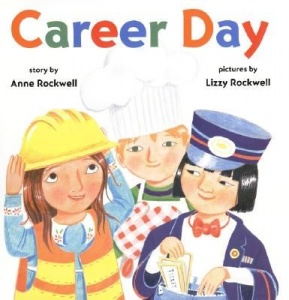Choosing a Career
Listen to the Recess! Clip
| Author | Ramona Caponegro |
| Air Date | 9/6/2005 |

Choosing a Career Transcript
“So, what do you want to be when you grow up?” is a standard inquiry that adults use to initiate conversation with the kids around them. The question may be asked with genuine sincerity and interest or as a mere matter of obligatory small talk, and it may be answered with enthusiasm, indifference, or terror, depending upon the young person’s age, certainty of plan, or the number of times that they have already responded to that question in the last fortnight. (So, please be especially careful in making this inquiry around the time of any graduation except possibly to kindergartners.)
Like most individuals, my own childhood list of potential careers covered several pages. It began with my desire, as a two-year-old, to become a potato chip truck driver; admittedly, more for the love of the contents of the truck than the prospect of actually driving it. My list went on to include plans for becoming a teacher, librarian, anthropologist, ichthyologist, writer, pediatric oncologist, actress, psychologist, and human rights advocate. Some of these proposed career goals, like being an anthropologist, fizzled out after only a week or so, I no longer remember why, but most of the dreams lasted from six months to a few years. Some, like teaching and writing, have continued in the present and are a big part of what I do. Yet, all of these career plans, even those that effervesced and disappeared, due in part to my lack of compatible gifts–I definitely cannot act and I refuse to park anything bigger than a sedan–have served as stepping stones on the path to self-discovery.
Fortunately, for many kids today, doors to this process of discovery are opening earlier than ever. Events like career fairs at school and Take Your Son or Daughter to Work Days expose children to the behind-the-scene realities of numerous careers, giving kids an opportunity to try on as many professional hats as they wish before deciding on which one might fit best. In the meantime, all those who are undecided can take consolation from Mary Schmich, who writes in “Wear Sunscreen: A Primer for Real Life,”her now famous mock graduation address, “The most interesting people I know didn’t know at twenty-two what they wanted to do with their lives. Some of the most interesting forty-year-olds I know still don’t.” While I personally don’t know if I want to aspire to quite that level of fascination, I would recommend an exploration of various careers if only to yield a better future answer to the kid who challenges, “So, what have you done as a grown-up?”
Source:
Schmich, Mary. “Wear Sunscreen: A Primer for Real Life.”Kansas City: Andrews McMeel Publishing, 1998. 26-27.